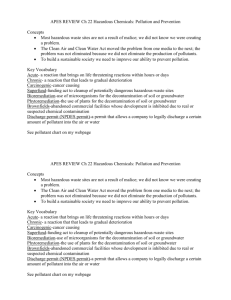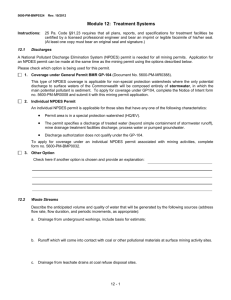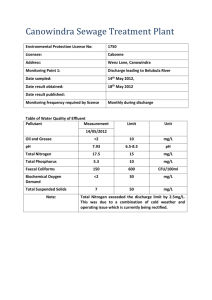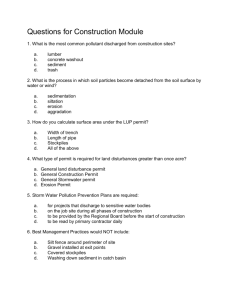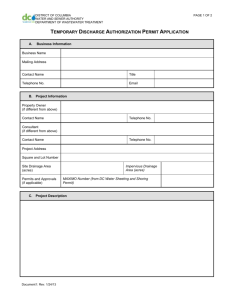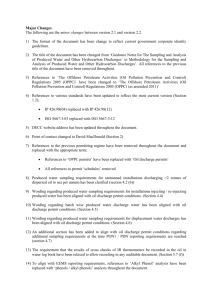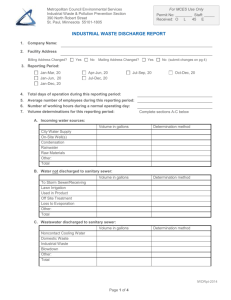Microsoft Word version
advertisement
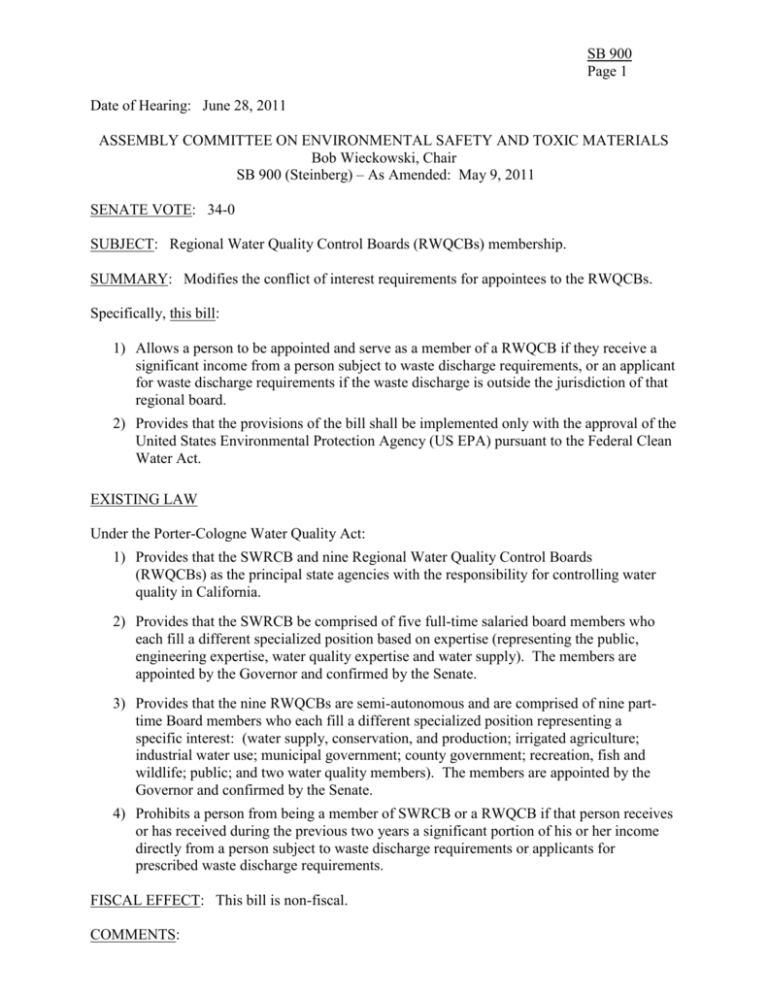
SB 900 Page 1 Date of Hearing: June 28, 2011 ASSEMBLY COMMITTEE ON ENVIRONMENTAL SAFETY AND TOXIC MATERIALS Bob Wieckowski, Chair SB 900 (Steinberg) – As Amended: May 9, 2011 SENATE VOTE: 34-0 SUBJECT: Regional Water Quality Control Boards (RWQCBs) membership. SUMMARY: Modifies the conflict of interest requirements for appointees to the RWQCBs. Specifically, this bill: 1) Allows a person to be appointed and serve as a member of a RWQCB if they receive a significant income from a person subject to waste discharge requirements, or an applicant for waste discharge requirements if the waste discharge is outside the jurisdiction of that regional board. 2) Provides that the provisions of the bill shall be implemented only with the approval of the United States Environmental Protection Agency (US EPA) pursuant to the Federal Clean Water Act. EXISTING LAW Under the Porter-Cologne Water Quality Act: 1) Provides that the SWRCB and nine Regional Water Quality Control Boards (RWQCBs) as the principal state agencies with the responsibility for controlling water quality in California. 2) Provides that the SWRCB be comprised of five full-time salaried board members who each fill a different specialized position based on expertise (representing the public, engineering expertise, water quality expertise and water supply). The members are appointed by the Governor and confirmed by the Senate. 3) Provides that the nine RWQCBs are semi-autonomous and are comprised of nine parttime Board members who each fill a different specialized position representing a specific interest: (water supply, conservation, and production; irrigated agriculture; industrial water use; municipal government; county government; recreation, fish and wildlife; public; and two water quality members). The members are appointed by the Governor and confirmed by the Senate. 4) Prohibits a person from being a member of SWRCB or a RWQCB if that person receives or has received during the previous two years a significant portion of his or her income directly from a person subject to waste discharge requirements or applicants for prescribed waste discharge requirements. FISCAL EFFECT: This bill is non-fiscal. COMMENTS: SB 900 Page 2 Need for the bill. According to the sponsors of this bill, "This change in statute will expand the pool of candidates eligible to serve on Regional Water Boards (RWQCB) by focusing the application of the 10-percent rule to apply on a per-region basis. Currently, people who receive more than 10 percent of their incomes from regulated interests are ineligible to serve which makes the pool of qualified individuals small. This bill would apply the provision to income from persons or entities that receive NPDES permits from the member’s regional water board but would not apply the restriction to income that is from persons or entities subject to an NPDES permit issued by other RWQCB." Standards for appointment to the RWQCBs. California Water Code Section 13201 provides for the Governor to appoint nine members to each of the nine RWQCBs. Each board member must reside or have a principal place of business within the region. Appointments are subject to confirmation by the state Senate. Both federal and state law provides that to be eligible for appointment to a RWQCB, that member must be free of conflicts of interest. The Federal Clean Water Act (Section 304 of the Clean Water Act) provides that the US EPA Administrator shall promulgate guidelines establishing the minimum procedural and other elements of any State program including a requirement that no board or body which approves permit applications or portions thereof shall include, as a member, any person who receives, or has during the previous two years received, a significant portion of his income directly or indirectly from permit holders or applicants for a permit. California's Porter-Cologne Water Quality Control Act (Water Code section 13388) mirrors federal law and provides that no person shall be a member of the SWRCB or a RWQCB if he or she receives or has received during the previous two years a significant portion of his income directly or indirectly from any person subject to waste discharge requirements or applicants for waste discharge requirements. Augments in support: A coalition of business and agricultural interests are supporting the proposed change to RWQCB conflict of interest standards. Specifically, they have stated, "In 2008, the California Environmental Protection Agency developed the Water Quality Improvement Initiative in an effort to improve the ability to identify, appoint and retain qualified candidates to serve on Regional Water Quality Control Boards. The 10 percent rule was one proposal that came out of that effort as it has been problematic finding qualified people to serve". Augments in opposition: A coalition of environmental groups have opposed the proposed changes to the conflict of interest standards as they have raised issues about the operational effect of the change as well as the need for federal conformance under the Federal Clean Water Act. Specifically they state, "This weakening effort raises significant legal concerns, as the conflicts requirement is a federal Clean Water Act mandate, and state law cannot scale back on federal CWA requirements. It has been our regular, direct experience over many years of seeking to fill Regional Water Board seats with qualified members that this task can sometimes be challenging – but for reasons other than a potential conflict outside of the region where the appointee lives and works. In particular, statewide permit conflicts (changes to which are extremely unlikely to pass federal U.S. EPA legal scrutiny) and low pay ($100/day) and are the major difficulties with filling seats, not other-region business ties. Moreover, contrary to the sponsor’s assertion, it is inaccurate to state that the federal 10% conflict provisions have caused a “dramatic reduction” in the pool of farmers eligible to be appointed. In fact, because the “10% SB 900 Page 3 rule” only applies to CWA NPDES permit holders, and the Act exempts irrigated agriculture return flows, irrigated agriculture appointees regulated only by waivers under the state’s PorterCologne Act are not bound by this federal CWA conflicts mandate." REGISTERED SUPPORT / OPPOSITION: Support Alliance of Western Milk Producers American Council of Engineering Companies of California California Agricultural Irrigation Association California Association of Sanitation Agencies California Business Properties Association California Chamber of Commerce California Citrus Mutual California Cotton Ginners and Growers Associations California Farm Bureau Federation California Forestry Association California Grain and Feed Association California Grape and Tree Fruit League California League of Food Processors California Manufacturers & Technology Association California Metals Coalition California Pear Growers California Rice Commission California Rice Industry Association California Seed Association California State Floral Association California Trucking Association California Warehouse Association California Wheat Growers Association Chemical Industry Council of California East San Joaquin Water Quality Coalition El Dorado Irrigation District Grower-Shipper Association of Central California Grower-Shipper Association of Santa Barbara and San Luis Obispo Counties Kings River Conservation District Kings River Water Association Monterey County Farm Bureau Nisei Farmers League Northern California Water Association Pacific Egg and Poultry Association Paso Robles Wine Country Alliance Salinas Valley Chamber of Commerce Santa Barbara County Farm Bureau Southern San Joaquin Valley Water Quality Coalition Valley Ag Water Coalition Western Agricultural Processors Association Western Growers Western Plant Health Association Wine Institute Opposition California Coastkeeper Alliance Heal the Bay Clean Water Action California Sportfishing Protection Alliance Sierra Club California Analysis Prepared by: Bob Fredenburg / E.S. & T.M. / (916) 319-3965

